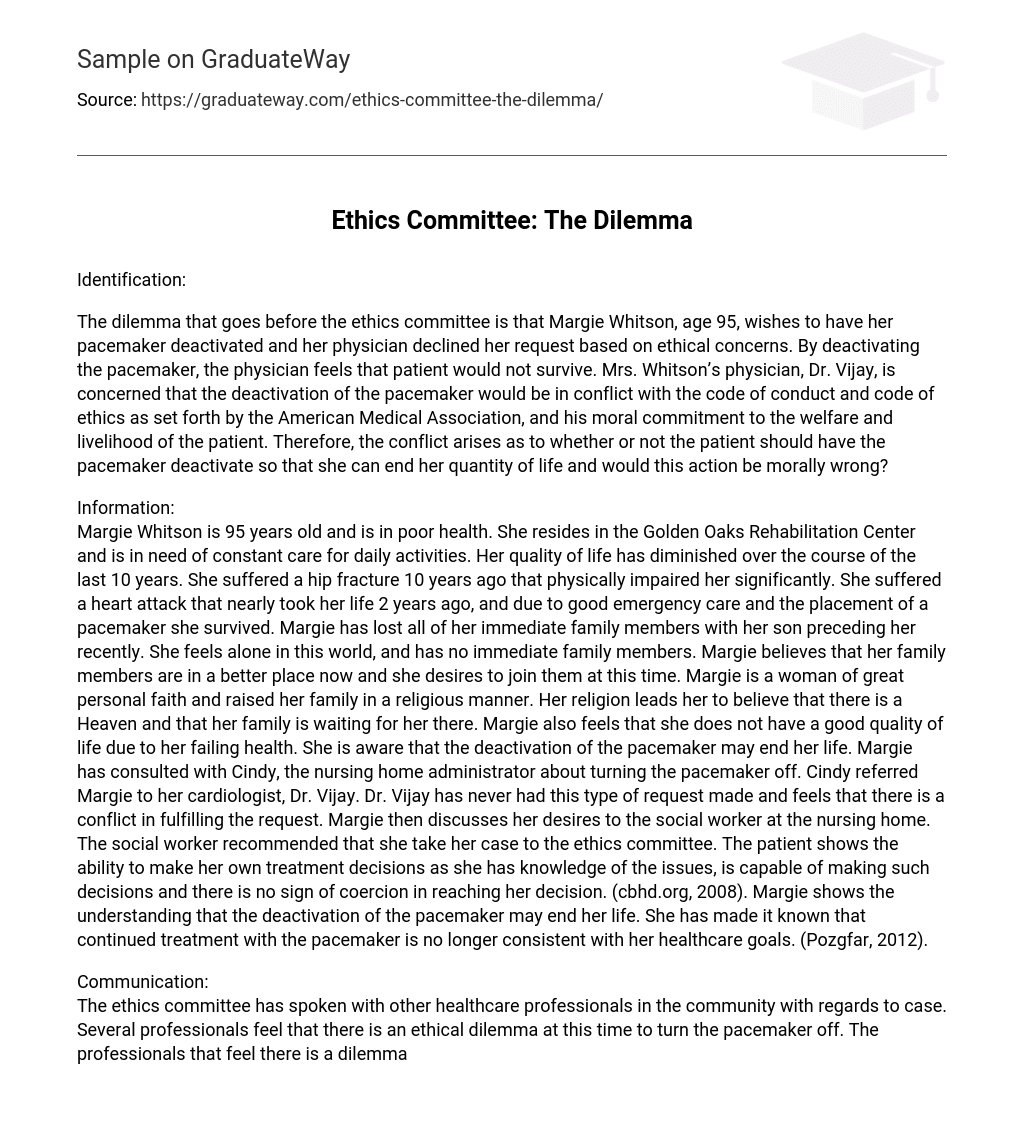Identification:
The ethics committee is facing a moral dilemma involving Margie Whitson, a 95-year-old individual who wishes to deactivate her pacemaker. Nevertheless, her physician has declined her request due to ethical concerns. According to the doctor, turning off the pacemaker could pose risks to the patient’s survival. Dr. Vijay, Mrs. Whitson’s physician, is worried that disabling the pacemaker would violate the code of conduct and ethics set forth by the American Medical Association and contradict his moral commitment to prioritize the patient’s well-being and existence. Consequently, a conflict arises regarding whether it would be morally incorrect to deactivate the pacemaker and allow Mrs. Whitson to spend her remaining days of life.
Information:
Margie Whitson, a 95-year-old woman, lives in the Golden Oaks Rehabilitation Center and requires constant care for her daily activities. Her health has declined over the past 10 years due to a significant hip fracture and a life-threatening heart attack two years ago. Prompt emergency care and a pacemaker implantation saved her life. Unfortunately, Margie has lost all of her immediate family members, including her recently deceased son. Despite feeling alone in the world now, Margie believes that her family members are in a better place and wants to join them. Being strongly religious, she finds solace in her faith and believes there is a Heaven where her family awaits her. Additionally, Margie feels that her failing health has greatly diminished her quality of life. Aware that deactivating the pacemaker may bring an end to her life, she sought advice from Cindy, the nursing home administrator.
Cindy directed Margie to consult with Dr.Vijay, Margie’s cardiologist who had never faced such a request before and is conflicted about fulfilling it. Seeking guidance from the nursing home’s social worker, Margie was suggested involving the ethics committee in their case.According to cbhd.org (2008), Margie possesses the necessary knowledge, autonomy,and absence of coercion to independently decide on treatment.Pozgfar (2012) further notes that Margie acknowledges that deactivatingher pacemaker may resultinher lifecomingtoanendFurthermore, she has expressed that her healthcare goals no longer coincide with continuing treatment using the pacemaker.
Communication:
The ethics committee has consulted with other healthcare professionals in the community regarding the case. Some professionals in agreement include Dr. Vijay, a Cardiologist; Jane Robinson, a Social Worker; and Cindy Mackin, a Rehabilitation Center Administrator. These professionals believe that there is currently an ethical dilemma in turning off the pacemaker. The ethics committee members have thoroughly discussed the issues involved and have personally spoken with the patient to understand her wishes. In analyzing similar ethical dilemmas in other cases, the committee has taken into consideration various consultations and examples before reaching a conclusion. (cbhd.org, 2008).
Choice:
The ethics committee has evaluated this case and similar cases and concluded the following: a) the patient’s depression could be attributed to the recent loss of her son, and b) the patient has the right to request deactivation of her device. The ethics committee considers this case comparable to a person on life support with a do not resuscitate order, which is deemed ethically and morally acceptable. It is recommended that three criteria be met prior to considering deactivation: 1) Informing the patient that turning off the pacemaker may not immediately result in death and that her health might deteriorate afterwards. Any symptomatic decline can be managed through appropriate treatment for pain or suffering. 2) Conducting a psychiatric evaluation to determine if her wishes are influenced by depression that might impact her decision-making capabilities. If so, she should undergo treatment for a specified period as determined by the physician. 3) If, after meeting these criteria, the patient still desires pacemaker deactivation, the ethics committee supports her decision and advises immediate compassionate deactivation (circep.ahajournals.org, 2009), (amednews.com, 2010).
The source for the references and citations is “Is It Permissible to Shut Off This Pacemaker? | The Center for Bioethics & Human Dignity.” It was accessed on 4th March 2008 and can be found on the website of the Center for Bioethics & Human Dignity. The webpage can be viewed online as of 18th July 2013.
O’Reilly, Kevin B. “Heart Devices Can Be Turned off near End of Life.” – Amednews.com. N.p., 5 May 2019. Web. 18 July 2013.
According to Kay, Neal, and Gregory T. Bittner (2009), there is a debate on whether implantable cardioverter-defibrillators and permanent pacemakers should be deactivated in patients with terminal illness. The authors of the article “Should Implantable Cardioverter-defibrillators and Permanent Pacemakers in Patients with Terminal Illness Be Deactivated?” argue both sides of the issue. The article was published in Controversies in Arrhythmia and Electrophysiology in 2009 and can be accessed online as of July 18, 2013.
The National Hospice & Palliative Care Organization’s NHPCO Board of Directors released a position statement in May 2008 regarding the care of hospice patients with automatic implantable cardioverter-defibrillators. This statement can be found on their website.
According to George Pozgfar in the book “Legal Aspects of Health Care Administration,” healthcare ethics is discussed in chapter 16. The book was published in Sudbury by Jones & Bartlett Learning in 2012 and is available in print format.





